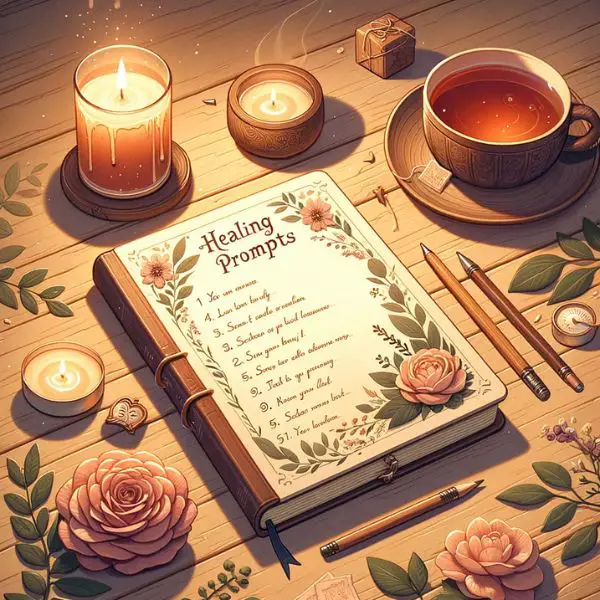Toxic relationships can have a profound impact on our mental and emotional well-being. They leave us feeling trapped, drained, and questioning our self-worth. But there is a way out. Through the powerful practice of journaling, we can embark on a journey of healing, self-reflection, and empowerment.
Journal Prompts for Healing from Toxic Relationships
Now that we understand the significance of journaling for healing, let’s explore a range of journal prompts that can guide us on our path to recovery and empowerment. These prompts will help us delve deep into our experiences, emotions, and aspirations, providing a foundation for healing and growth.
Journal Prompts For Toxic Relationships

Reflect on the Relationship
Prompt: What was the turning point that made you realize your relationship was toxic?
Reflect on the moment or event that made you question the healthiness of your relationship. Explore your thoughts and emotions during that time and how they impacted your perception of the relationship.
Prompt: How did the toxic relationship make you feel about yourself?
Examine the impact of the toxic relationship on your self-esteem and self-worth. Reflect on the negative beliefs or messages you internalized and how they influenced your perception of yourself.
Prompt: What were the signs and red flags that you ignored or minimized in the relationship?
Take a moment to reflect on the warning signs and red flags that were present in the relationship. Consider why you may have overlooked or downplayed these indicators and what you can learn from them.
Some More Prompts
- What were your initial thoughts and feelings about the relationship?
- How did the relationship evolve over time?
- Did you feel happy, safe, and respected in the relationship?
- What were some signs or behaviors that made you realize that the relationship was toxic?
- Looking back, what would you do differently in the relationship?
- How do you think the toxic dynamic affected you?
Processing Emotions and Trauma
Prompt: What emotions are you currently experiencing as a result of the toxic relationship?
Identify and explore the range of emotions you are currently experiencing. Write about how these emotions manifest in your daily life and any patterns or triggers you have noticed.
Prompt: How has the toxic relationship affected your self-image and self-confidence?
Reflect on how the toxic relationship has impacted your self-image and self-confidence. Write about any negative beliefs or doubts that have emerged as a result and explore ways to rebuild and strengthen your self-esteem.
Prompt: What traumas or wounds from the toxic relationship do you need to heal?
Identify the specific traumas or wounds that the toxic relationship has left behind. Explore the emotions and memories associated with these traumas and consider seeking professional support or therapy to aid in your healing process.
Some More Prompts
- What emotions do you feel about the relationship? (e.g., anger, sadness, disappointment, guilt, fear, shame)
- Are there any patterns in your emotional responses to the toxicity?
- How do you cope with intense emotions related to the toxic relationship?
- How have your emotions changed over time?
- Are there any triggers that make your emotions flare up?
- What would you like to feel instead of the negative emotions?
Setting Boundaries and Reclaiming Power
Prompt: What boundaries were crossed or violated in the toxic relationship?
Reflect on the boundaries that were crossed or violated during the toxic relationship. Identify which boundaries were compromised and consider how you can establish and enforce healthy boundaries in future relationships.
Prompt: How can you reclaim your power and assert your needs in relationships moving forward?
Explore ways in which you can reclaim your power and assert your needs in future relationships. Consider what healthy communication, self-advocacy, and boundary-setting look like for you, and write down actionable steps to implement these practices.
Prompt: What are your non-negotiable values and deal-breakers in future relationships?
Reflect on your values and what is important to you in a healthy, fulfilling relationship. Identify your non-negotiables and deal-breakers to ensure that you establish relationships that align with your core beliefs and needs.
Some More Prompts
- What are your needs and wants in a healthy relationship?
- Was the toxic relationship meeting your needs? If not, which needs were neglected?
- What are your personal boundaries? How were they violated in the toxic relationship?
- Why do you think you struggled to enforce your boundaries?
- How can you assert your boundaries in the future?
- What steps can you take to prioritize your needs and boundaries?
Cultivating Self-Love and Growth

Prompt: What are your strengths, qualities, and accomplishments that make you unique?
Celebrate and acknowledge your strengths, qualities, and accomplishments. Write a list of all the things that make you unique and deserving of love, respect, and happiness.
Prompt: How can you practice self-care and self-compassion during your healing journey?
Explore ways in which you can prioritize self-care and self-compassion as you navigate the healing process. Write down activities, rituals, or practices that nourish and nurture your mind, body, and soul.
Prompt: What lessons have you learned from the toxic relationship, and how will they shape your future?
Reflect on the lessons you have learned from the toxic relationship. Consider how these lessons can inform your future choices, behaviors, and relationships, ultimately guiding you toward growth, resilience, and empowerment.
Identify Your Strengths and Resources
- What are your strengths that have helped you cope with the toxic relationship?
- Who are your support systems? How have they helped you?
- Do you have any self-care rituals that benefit you?
- What hobbies or activities make you feel good?
- What positive changes have you made as a result of the toxic relationship?
- How can you utilize your strengths and resources to heal and move forward?
Focus on Healing and Growth
- What would it mean to heal from a toxic relationship?
- What steps can you take to promote healing and growth?
- What lessons have you learned from the toxic relationship?
- What personal growth opportunities were presented to you because of the toxic relationship?
- How will you approach future relationships differently?
- What goals do you have for your emotional well-being and relationship satisfaction?
The Benefits of Journaling for Healing
Journaling is a therapeutic tool that allows us to process our thoughts and emotions, gain clarity, and release the weight of toxic relationships. It offers a safe space to explore our experiences, identify patterns, and cultivate self-awareness. By putting pen to paper, we invite our innermost selves to speak and guide us toward healing and growth.

Identifying the Issue
One of the first steps in healing from a toxic relationship is recognizing and understanding the issue at hand. Journaling provides an opportunity to step outside of ourselves and view the relationship from a new perspective. By writing about different situations and feelings, we can gain clarity on the dynamics at play and the impact they have had on us.
Emotional Release
Toxic relationships often leave us with a myriad of emotions, ranging from happiness and love to guilt, anxiety, and loneliness. Journaling acts as a powerful outlet for these emotions, allowing us to release them from within. By putting our thoughts and feelings onto paper, we can acknowledge and validate our experiences, letting go of the burden they carry.
Increasing Self-Worth
Toxic relationships often erode our sense of self-worth, leaving us feeling unworthy and unlovable. Through journaling, we can reclaim our self-worth by exploring our positive qualities, strengths, and values. By acknowledging our worth and reminding ourselves of our inherent value, we can rebuild our self-esteem and establish healthier boundaries in future relationships.
Conclusion:
Journaling is a powerful tool for healing and recovering from toxic relationships. Through introspection, reflection, and self-expression, we can release our emotions, gain clarity, and reclaim our power. By engaging with these journal prompts, we embark on a transformative journey toward healing, growth, and the establishment of healthier relationships.
Remember, healing takes time and patience. Be gentle with yourself as you navigate the ups and downs of the healing process. Journaling is your ally, offering solace, insight, and empowerment as you embark on the path to recovery and a brighter future.
Additional Information: It is important to note that journaling is not a substitute for professional help. If you are in an abusive or dangerous situation, please seek immediate support from a trusted friend, family member, or professional.
Check Out:
- 60 Morning Journal Prompts To Kickstart Your Day
- 60 Journal Prompts For Relationships
- 80 Journal Prompts For Trauma Healing
- 80 Journal Prompts For Spiritual Growth
- 40 Journal Prompts To Combat Loneliness
- 30 Journal Prompts For Self-improvement
- 60 Journal Prompts About Change
- 60 Journal Prompts For Overcoming Insecurity
- 60 Journal Prompts To Get Over A Breakup
- 60 Journal Prompts For A Money Mindset
- Stop Overthinking With These 85 Journal Prompts
- 65 Journaling Prompts For Self Love
- 60 Journal Prompts For Parents
- 60 Journal Prompts For Moms
- 60 Journal Prompts For Grandparents
- 60 Eating Disorder Recovery Journaling Prompts
- 60 Journal Prompts For Codependency
- 30 Journal Prompts For Boundaries
- 80 Journal Prompts For 2nd Grade
- 65 Monday Journal Prompts For Students
Katherine is the passionate educator and writer behind HandwritingwithKatherine.com. As a dedicated teacher, she cherishes the art of handwriting and its unique reflection of individuality. Beyond the classroom, Katherine delves into the world of writing, sharing a blend of educational insights and personal stories. When she’s not teaching or blogging, Katherine can be found exploring bookshops or writing with a comforting cup of tea in hand.

